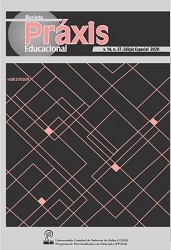SOCIO-PSYCHOLOGICAL ISSUES OF CHANGING VALUES IN ADOLESCENTS - YOUTH IN EDUCATION
DOI:
https://doi.org/10.22481/praxisedu.v16i37.6406Keywords:
Education, Adolescent-youth, Values system, Social-psychological issuesAbstract
The article studies the socio-psychological issues of changing values in adolescents - youth in education. The research has been conducted with the adolescent- youth and their parents, the dynamics of changing values was followed. The research has shown that the important values during the comparison of compatibility of the values of parents with the values of adolescent-youth living in the city and region dominate directly on some values. But among these values they are especially conservatism, openness to innovations, self confirmation and self realization values. The factor of importance between these values is tendency characterized and fundamentally don’t differ from each other. The factor of importance shows itself only in the direction of self-realization.(in the level of p=0.046, r= 6.146*). That change shows that either the youth or adolescents prefer more self-confirmation values comparing the previous years in education. Considering it, it is recommended to create a condition for self-realization of its subjects in education.
Downloads
References
Jabbarov R.(2017). Factors affecting the development of self-realization among students of different professions. Science and Education, 9, 75-87. 10.24195/2414-4665-2017-9-12.
Jabbarov R.; Mustafayev, M ; Kazimova, K ; Valiyeva, Y (2018) .FACTORS AFFECTING STUDENTS' PROFESSIONAL IDENTITY, .SCIENCE AND EDUCATION, DoI: 10.24195/2414-4665-2018-1-5
Barney, D. (2009). Trasmettere valori. Tre generazioni familiari a confronto [Transmittig values. A comparison between three family generations]. Milano: Unicopli. (in Italian)
Barney, D., Ranieri, S., Scabini, E., & Rosnatiet, R. (2011). Value transmission in the family: do adolescents accept the values their parents want to transmit? Journal of Moral Education, 1(40), 105-121.
Berry, J. W., Poortinga, Y. H., Segall, M. H., & Dasen, P. R. (1992). Cross-cultural psychology: Research and applications. New York: Cambridge University Press.
Boehnke, K. (2001). Parent-offspring value transmission in a societal context: Suggestions for a utopian research design with empirical underpinnings. Journal of Cross-Cultural Psychology, 32, 241-255.
Boehnke, K., Hadjar, A., & Baier, D. (2007). Parent-child value similarity: The role of Zeitgeist. Journal of Marriage and Family, 69, 778-792.
Cohen, S., Doyle, W., & Alper, C.(2009): Sleep Habits and Susceptibility to the Common Cold. Archives of Internal Medicine; 169(1): 62-67.
Carl Lamote &Nadine Engels (2010). The development of student teachers’ professional identity. Explore European Journal of Teacher Education, 3-18.
Fuligni, A., & Zhang, W. (2004). Attitudes toward family obligations among adolescents in contemporary urban and rural China. Child Development, 74, 180-192.
Kuczynski, L., & Navara, G. S. (2006) Sources of innovation and change in socialization, internalization and acculturation. In M. Killen & J. G. Smetana (Eds.), Handbook of moral development (pp. 299-327). Mahwah, NJ: Lawrence Erlbaum Associates.
Roest, A. M. C., Dubas, J. S., & Gerris, J. R. M. (2009). Value tran¬smissions between parents and children: gender and developmental phase as transmission belts. Journal of Adolescence, 33(1), 21-31.
Schonpflug, U. (2001). Intergenerational transmission of values: The role of transmission belts. Journal of Cross-Cultural Psychology, 32, 174-185.
Schwartz, S. H. (2014). National culture as value orientations: Con¬sequences of value differences and cultural Distance. In V. A. Ginsburgh & D. Throsby (Eds.), Handbook of the economics of art and culture (Vol. 2, pp. 547-586). Amsterdam: Elsevier.
Schwartz, S., Butenko, T. P., Sedova D. S., & Lipatova, A. S. (2012). A refined theory of basic personal values: validation in Russia. Psychology. Journal of Higher School of Economics, 9(2), 43-70.
Steca, P., Monzan, D., Greco, A., & D'Addario, M. (2012). Similarity in self-enhancement and self-transcendence values between young adults and their parents and friends. Family Science, 1(3), 34-45.
Swader, C. S. (2013). The capitalist personality: Face-to-face sociality and economic change in the post-communist world. New York: Routledge.
Trommsdorff, G. (2009). Intergenerational relations and cultural transmission. In U. Schonpflug (Ed.), Cultural transmission. Psychological, developmental, social, and methodological aspects (pp. 126-160). New York: Cambridge University Press.
Vedder, P., Berry, J., Sabatier, C., & Sam, D. (2009). The intergenerational transmission of values in national and immigrant families: The role of Zeitgeist. Youth Adolescence, 38, 642-653.
Mudrik, A. V. (2000). The main components of mesofactors influence on socialization of man. In V. A. Slastenin (Ed.), Social pedagogy, pp. 31-50). Moscow: Academy
Yadov VA (2007) Sociological strategy of socialization. M.: Omega-L, 2007, 567 p.
Downloads
Published
How to Cite
Issue
Section
License
Você é livre para:
Compartilhar - copia e redistribui o material em qualquer meio ou formato; Adapte - remixe, transforme e construa a partir do material para qualquer propósito, mesmo comercialmente. Esta licença é aceitável para Obras Culturais Livres. O licenciante não pode revogar essas liberdades, desde que você siga os termos da licença.
Sob os seguintes termos:
Atribuição - você deve dar o crédito apropriado, fornecer um link para a licença e indicar se alguma alteração foi feita. Você pode fazer isso de qualquer maneira razoável, mas não de uma forma que sugira que você ou seu uso seja aprovado pelo licenciante.
Não há restrições adicionais - Você não pode aplicar termos legais ou medidas tecnológicas que restrinjam legalmente outros para fazer qualquer uso permitido pela licença.












